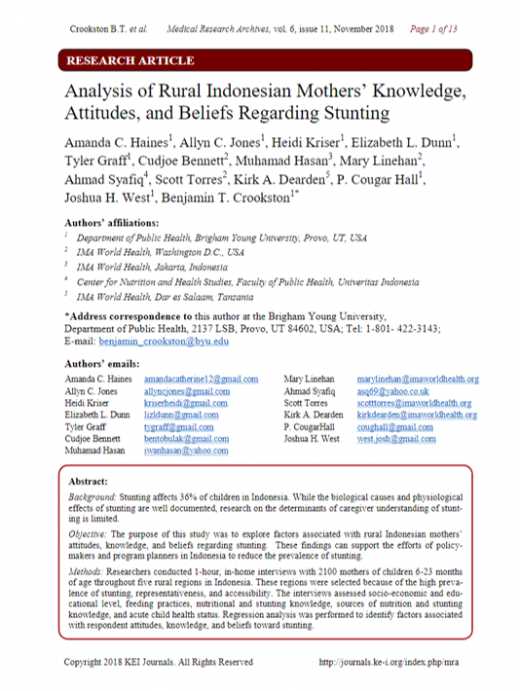Analysis of rural Indonesia mothers’ knowledge, attitudes, and beliefs regarding stunting
Peer Reviewed Articles
Analysis of rural Indonesia mothers’ knowledge, attitudes, and beliefs regarding stunting
Background: Stunting affects 36% of children in Indonesia. While the biological causes and physiological effects of stunting are well documented, research on the determinants of caregiver understanding of stunting is limited.
Objective: The purpose of this study was to explore factors associated with rural Indonesian mothers’ attitudes, knowledge, and beliefs regarding stunting. These findings can support the efforts of policy-makers and program planners in Indonesia to reduce the prevalence of stunting.
Results: A negative relationship was found between having received information about stunting more than six months prior and knowledge of stunting (ẞ=-0.24, P=0.001). Having never received information on child nutrition was negatively associated with stunting beliefs (ẞ=0.20, P<0.0001). Although there was no significant difference in amount of knowledge between those who had received their knowledge about stunting from a professional versus the internet, having primarily received information from a neighbor/friend, was negatively associated with knowledge of stunting (ẞ=-0.20, P=0.007). This finding was the same for stunting beliefs (ẞ=-0.40, P<0.0001).
Conclusion: Caregiver knowledge, attitudes, and beliefs toward stunting can be significantly impacted by their exposure to both accurate and inaccurate information. From this research, initiatives aimed at reducing stunting in Indonesian children should consider ways to integrate new education systems that increase the range of exposure and incorporate use of the social network in order to impact health behavior change.
Read the article

